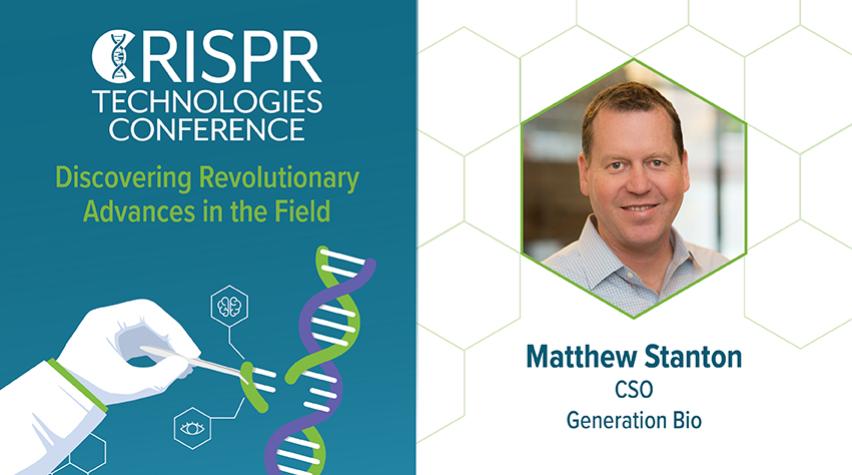
Organized by AIChE’s Society for Biological Engineering (SBE), the 2023 International Conference on CRISPR Technologies will be held October 17–19, 2023 at the Revere Hotel Boston Common, Boston, MA. The conference will focus on the latest advances in the genome editing field, bringing together key stakeholders with aligned interests across the spheres of academia and industry. Reserve your spot today.
We spoke with Matthew Stanton, CSO of Generation Bio, to discuss DNA delivery solutions, trends in CRISPR research, and how CRISPR technologies will advance some of the Grand Challenges in engineering and society.
What specifically will you be talking about at the conference?
I will be speaking on delivery of DNA without the reliance on viruses. Non-viral solutions offer significant advantages: they offer better analytical characterization, large cargo capacity, and are non-immunogenic, re-dosable and titratable clinically, and more cost effective. They essentially have more drug-like properties. However, significant hurdles exist for solving non-viral DNA delivery, notably, doing so without triggering dose limiting innate immune responses and effectively accessing the nucleus of post-mitotic cells. To truly gain the full benefit of CRISPR technologies, we will need to develop solutions to large DNA donor template delivery beyond the use of viruses like AAV.
How do CRISPR technologies influence/overlap with other areas of bioengineering?
The advent of CRISPR technologies influences the need for delivery solutions. Right now the biggest gap in delivery is how to deliver DNA for donor templates without the use of viruses and how to delivery nucleic acids beyond the liver to other tissues and cell populations. CRISPR creates an urgent demand signal for these solutions.
What are some of the technologies trending in the CRISPR field?
Large DNA donor insertions, particularly into endogenous loci. Epigenetic gene editing and increased focus on extra-hepatic delivery are trending as well.
How do you envision CRISPR technologies advancing some of the Grand Challenges in engineering and society (medicine, health informatics, etc.)?
The ability to address disease at the genetic source will continue to expand the possibilities of medicines in the future. CRISPR will likely play an enormous role in this.
What are you looking forward to the most at this year’s conference?
Seeing the full spectrum of technologies presented in one conference. Combining both the breadth and depth of science in such an exciting space.
About SBE
Established in 2004, the Society for Biological Engineering is a technological community for engineers and applied scientists integrating biology with engineering. Members of SBE come from a broad spectrum of industries and disciplines and share in SBE’s mission of realizing the benefits of bioprocessing, biomedical, and biomolecular applications. Learn more about SBE.
Learn more about the 6th International Conference on CRISPR Technologies.


